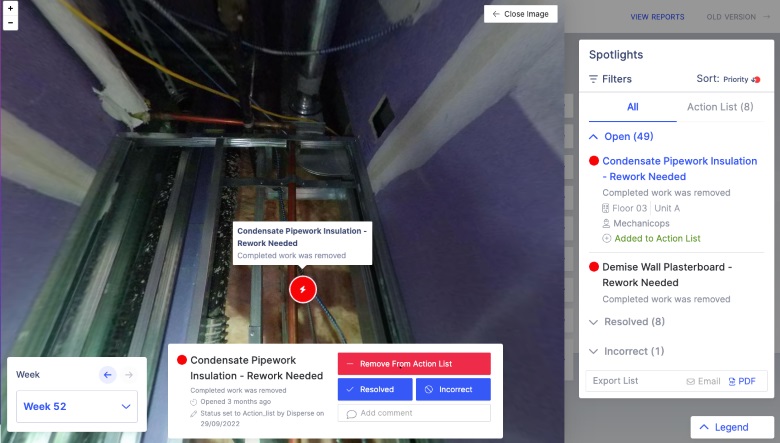Disperse.io, a U.K.-based construction technology company with a platform that uses artificial intelligence to help project managers track work, capture data from building sites and make better project decisions, has launched a new product, Impulse, that highlights issues gleaned from 360° site scans captured in its platform.
Impulse integrates performance insights into building elevations and presents issues to project managers. Work-in-place information can then be displayed over building elevations during coordination meetings to give contractors more informed discussions with their trade contractors.
Issues that range form ensuring that a ceiling is closed after the rerouting of a pipe to quantifying outstanding scope in order to source a new trade contractor can be informed via Impulse's AI. It tracks issues that come up on site using photographic documentation obtained through regular site scans. Impulse also coordinates drawings, BIM models, plans and construction schedules to give project insights to managers.
"There is a degree of prediction where we can enable site teams to note things such as work is about halfway done, and go to their [trade] contractors and say this is how much time you have until a certain system is installed and closed," says Harsh Vardhan Singh, chief product officer at Disperse. "I would say we haven't entirely gone over the threshold. We're very much rooted in the practicality of what's to date onsite."
Singh said what allows Impulse to make its recommendations is the extracted data from the site images that Disperse captures. Impulse can be used to track work-in-place insights from more than 480 project components across the superstructure, envelope or façade, MEP systems and in the construction fit-out process. Work-in-place is validated by interactive building elevations that filter by trade, task activity, object or component, and location.
"Within the context of longer-term, aggregated data that is generated through the software, we are anticipating the ability to identify patterns across several completed projects," says Thomas Alaimo, deputy operations manager and project executive at Urban Atelier Group, which is using Impulse on a confidential project as part of the product's beta testing.
Disperse raised $16 million in September in its most recent round of venture capital funding, and Singh said the company plans to stay focused on its platform and its mission to provide better onsite project-based insights.
Alaimo said Impulse has already shown value to the contractor on the 480-unit vertical project its being used on.
"Its ability to detect, early on, work in place that deviates from contract drawings or a 3D BIM model has been extremely valuable to the team in getting out ahead of problem solving on those issues," he said.





